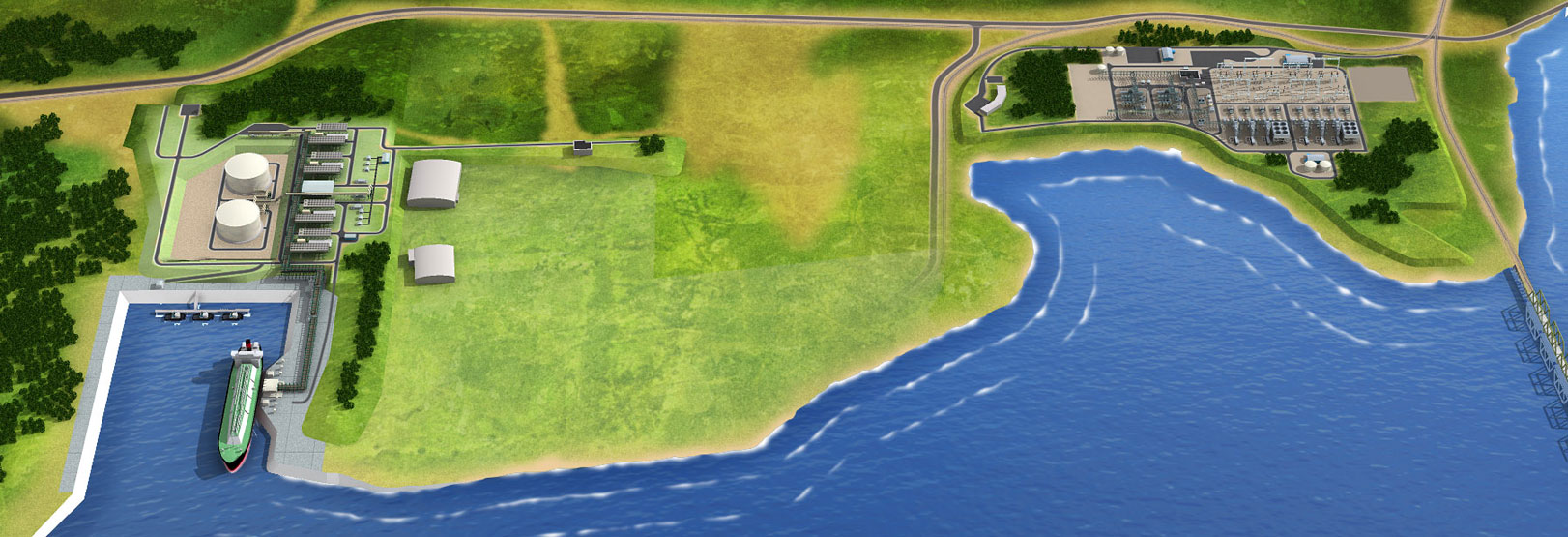On Sept. 30, the Federal Energy Regulatory Commission approved the final environmental impact statement for a contentious $7.5 billion Liquefied Natural Gas export facility, pipeline, and power plant in Coos Bay, Ore. More approvals are still needed.
"If approved, Jordan Cove LNG and Pacific Connector [Gas Pipeline Project] would construct a natural gas liquefaction and export facility with an adjacent [420 MW natural gas-fired combined cycle power] plant, along with a 232-mile natural gas pipeline stretching from Malin [Klamath County] to the terminal," writes James Cronin for the Portland Business Journal.

While the approval was critical, more are necessary before construction can begin.
“We’ve been here before with FERC and we will push back on their flawed analysis once again,” Susan Brown, an attorney with the Western Environmental Law Center, said in (a) statement.
“Most importantly, we know Oregon has the legal authority and ample reasons to reject this project, and we are counting on Governor [Kate] Brown to stand up for all Oregonians.”
Western Environmental Law Center explains the interesting economic background of LNG facility that reflects the transition of the United States from a major energy consumer to a major producer (as well as a consumer).
Initially, the project was planned to allow for natural gas to be imported at the Jordan Cove terminal then piped to California and Nevada markets. But the project changed in September 2011 to export LNG from Canada and the US Rocky Mountain region to markets in Asia.
A final approval from the U.S. Department of Energy is needed. Sen. John Barrasso (R-Wyoming), a member of the Committee on Energy and Natural Resources, told the Associated Press:
The administration has given communities along the Gulf Coast and East Coast the opportunity to access overseas markets," Barrasso said in a statement. "It must not leave the West behind."
All of the approved LNG export facilities [PDF] in the U.S. are along the Gulf Coast plus one in Cove Point, Maryland.
But approvals alone do not guarantee construction of these facilities.
"Plummeting crude oil prices have dimmed prospects for soon-to-start U.S. liquefied natural gas exports, Bank of America Corp. said in a note to clients [on Aug. 24]," wrote Christine Buurma for Bloomberg News on Aug. 25.
A July study from Brookings Institution concluded that competition from foreign LNG competitors would also suppress construction of new U.S. LNG export facilities, according to a June article in FuelFix.
In an unrelated energy development setback in Coos Bay, it appears that a renewable, offshore wind facility posted here last year will not be going forward.
Hat tips to The AASHTO Daily Transportation Update (Oct. 01) and Dave O'Leary, Maryland Sierra Club.
FULL STORY: Contentious Coos Bay LNG terminal gets federal go-ahead

Planetizen Federal Action Tracker
A weekly monitor of how Trump’s orders and actions are impacting planners and planning in America.

Chicago’s Ghost Rails
Just beneath the surface of the modern city lie the remnants of its expansive early 20th-century streetcar system.

San Antonio and Austin are Fusing Into one Massive Megaregion
The region spanning the two central Texas cities is growing fast, posing challenges for local infrastructure and water supplies.

Since Zion's Shuttles Went Electric “The Smog is Gone”
Visitors to Zion National Park can enjoy the canyon via the nation’s first fully electric park shuttle system.

Trump Distributing DOT Safety Funds at 1/10 Rate of Biden
Funds for Safe Streets and other transportation safety and equity programs are being held up by administrative reviews and conflicts with the Trump administration’s priorities.

German Cities Subsidize Taxis for Women Amid Wave of Violence
Free or low-cost taxi rides can help women navigate cities more safely, but critics say the programs don't address the root causes of violence against women.
Urban Design for Planners 1: Software Tools
This six-course series explores essential urban design concepts using open source software and equips planners with the tools they need to participate fully in the urban design process.
Planning for Universal Design
Learn the tools for implementing Universal Design in planning regulations.
planning NEXT
Appalachian Highlands Housing Partners
Mpact (founded as Rail~Volution)
City of Camden Redevelopment Agency
City of Astoria
City of Portland
City of Laramie


























